Coca to Iquitos by Boat
Journal 12: Coca, Nueva Rocafuerte, Pantoja, Iquitos, Rio Napo, Amazon River, Travel from Ecuador to Iquitos Peru by boat.
Coca to Nueva Rocafuerte via Rio Napo
The Amazon leg of our journey was the first segment not accomplished by bicycle. For this section, we would travel by river, as no roads exist. On a Sunday morning, Bibi and I woke early and went down to the docks to board a canoe around 7 in the morning. Tickets to Nueva Rocafuerte were $15 a piece, purchased from the boat captain, whom we were introduced to through the tourism office down at the Coca docks the prior day. When we arrived, we watched with our fully loaded bicycles as more and more people boarded this boat, but when we tried to climb aboard with our bicycles, we were told to wait. This turned out to be a mistake. By the time they loaded our bikes aboard, there were no seats available, and we were left sitting on the floor in very cramped quarters for the first 6 hours of our 12-hour boat trip down the Rio Napo.
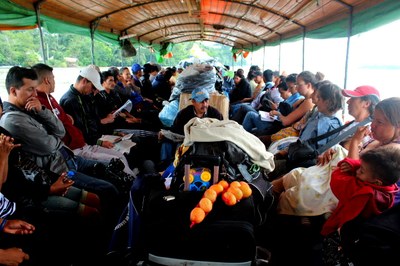
I am a man who really likes his personal space, so the first part of this trip was uncomfortable to say the least. I was shifting my weight constantly with cramps, and lack of circulation defining journey. Around 1pm, we made a bathroom stop, and Bibi and I immediately secured two seats for ourselves, which made the second half of this journey more comfortable. I met an anthropologist from Colombia named Nicholas during this final leg who would travel with us, providing enormous entertainment throughout the week. We arrived in Nueva Rocafuerte just after sundown and were escorted to the one hostel in town. There we met Maren (Germany), Lina, Javier, and Julia (Bogota), and Pascal (God only knows). These would be our traveling companions throughout the coming days.
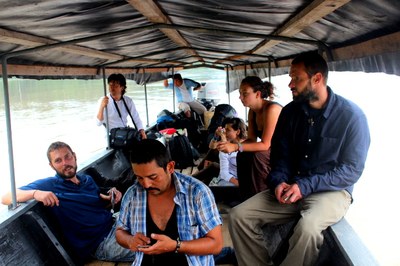
The following morning, we stopped in the immigration office after arranging for a boat, which would take us across the Ecuador-Peru border. Immediately there were problems. First, they didn’t acknowledge my Ecuadorean visa. But this was the least of my concerns. I knew I had a valid visa and it was only a matter of getting the right people on the phone to clear this problem up. More disconcerting was the fact that Bibi had been illegal in Ecuador for over a month. We knew this, but we’d read there were no fines associated with this in numerous places online. Still, I carried a little extra bribe money, hoping it might get us out of a pinch. It didn’t. The immigration official and military officer in the room would not hear talk of money. The message was clear. Bibiana would be transported to Coca where she would stay in jail until she could be deported to Colombia. At one point they tried to give me an exit stamp to leave the country without her. Obviously I said I would stay with her. (Afterwards, I couldn’t help but pondering the awkward boat ride we would have had if I’d received my stamp and simply wished Bibi the best!) I got up and called my lawyer in Quito and thankfully got an answer. She spoke to me, then with the immigration officer, then with me again, then with him again. She advised me that a) he was within his rights to deport her, and b) it would be very uncommon practice if he actually did, given that she was trying to leave the country anyway.
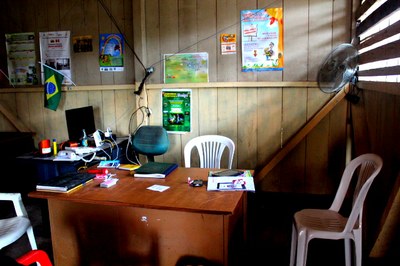
She said to stay calm, which is the secret to dealing with power-happy bureaucrats, and she wished us the best. Not exactly what I wanted to hear, but it was good advice. I told the immigration officer that we understood that he was within his rights, that it was his decision, and pleaded for his mercy. After insisting that the lawyer did nothing to help us, he stamped our passports.
Whether this contact did in fact help us along, we’ll never know. It certainly didn’t hurt, and I was extremely glad to have someone to advise us on this problem. Our feeling was that these two were just enjoying the pathetic bit of power that they possessed and would have eventually let us through, so long as we remained calm. That said, I’m quite sure that if either one of us had lashed out verbally, Bibi would have gone to jail, been deported, and this trip never would have happened.
The Amazon would test our patience numerous times throughout our journey, and the Nueva Rocafuerte immigration office was an entrance exam with extremely high stakes.
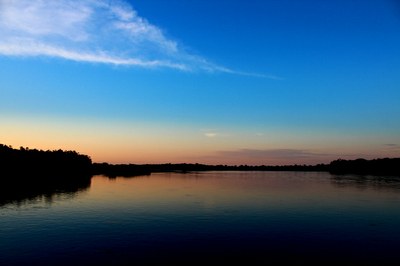
Nuevo Rocafuerte to Pantoja
We boarded a boat that hour with our crew of 7 for Pantoja, arranged by the Señora who ran the hostel. We negotiated this from $80 to $60 for the group. This 2 hour boat ride was fantastic as we were in the same size lancha that we’d ridden in the previous day with over 80 people. This time, it was just the 8 of us (including the captain). We rolled into Pantoja, a lovely little town on the banks of the Rio Napo, and the immigration experience entering Peru could not have been any more pleasant. There was only one catch. The boat to Iquitos had left the previous day. It would be a week before the next one departed.
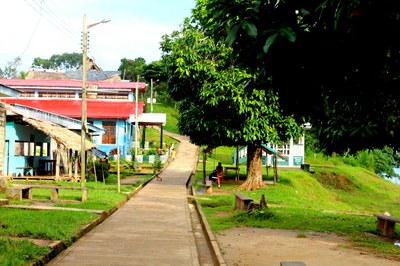
Days in Pantoja passed in similar fashion.
Reading in the morning. I was limited to reading books already in my kindle library, but enjoyed my re-read of Under the Volcano, by Malcom Lowrey though was much farther removed from his theme of despair and tortured alcoholism than I was when I first read the book some 6 years ago.
Lunch with Senora Etelbina. Although there were some fine meals, and she made for lovely conversations, I will always remember this restaurant as where we unknowingly ate majas, which is basically a huge amazon rat. She called it lomo (beef) It was definitely not beef. We also took note of a pointed (if not hilarious) comment that this lady made stuck with us for much of our trip through the jungle. Colombia produces coffee. Brazil produces technology. What does Peru produce? Hijos (children). It is true. I’ve never seen a larger proportion of kids that I have in the rainforest. I’ve also never seen so much undeveloped land. Sometimes evolution really seems like its out to screw us.
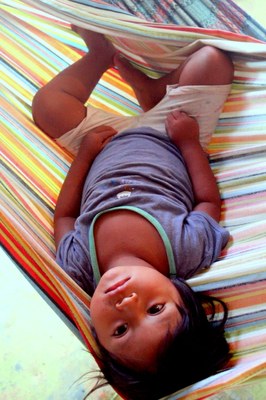
Village walks. After lunch, the group would stroll through town and Javier would introduce us to new fruits. The marañon, a red jungle fruit, may be the greatest thing on the planet. I’ve never seen one before, and I haven’t seen one since. If I do, I will try to find a way to preserve these things to share with everyone. My dream house will have a tree in the back yard. We also made a habit of buying or trading for sugar cane on these hikes, which we hacked up with machetes and chewed as we strolled around town. Below is a nice picture of the group doing just that.
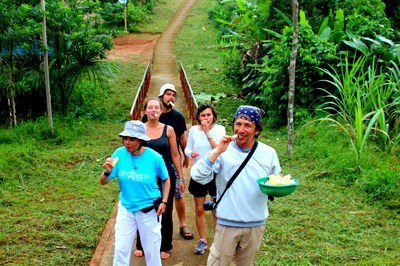
Evening Swims. Although the strength of the Rio Napo made it impossible to swim far from the shore, we enjoyed cooling off on the banks late each afternoon. The first day I saw some kids jumping from a branch some 16 feet into the river. The second day I was right there alongside them.
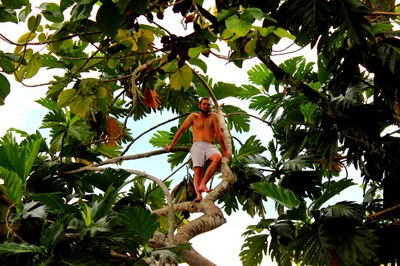
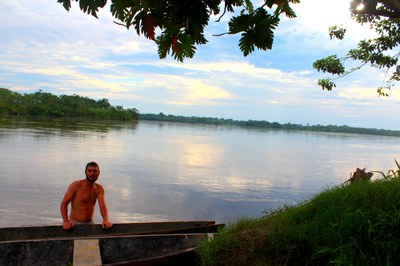
Cookies for Dinner. For some reason, we never arranged dinners in Pantoja. We just ate cookies, which Nicholas and I washed down with local sugar cane liquor. Just 40 cents to fill a water bottle full of the stuff, strait from the barrel, and every day it sat it in the sun, it got stronger and stronger. I’ve never drank for so cheap!
Every day we anxiously waited news for the boat, and each day things seemed to get pushed back. The week was filled with false hopes, but none was more trying than Friday’s experience. All week, the promise of this boat was held before us, and by Friday morning, we were all packed up, counting down the hours until it was due to arrive at 5 pm. Then 8pm. Then 10pm. Then 2am...
All our bags were waiting outside our open door, and the hallway, despite not having electricity, was haunted by the footsteps of our group, constantly on the lookout for this boat which was due to arrive. Finally, at 3:30am, the boat arrived under the cover of darkness, and there was suddenly a mad dash to unload the cargo. What this cargo was remains a mystery, and perhaps the only thing suspect about it was the hour that all this took place. Still, it was a very strange sight to behold. By and by, we were informed that the cost of this boat was 150 soles ($60) per person, and it would arrive in Iquitos in 14 hours. To the rest of the group, save Pascal, this price was too high, and we resolved at 5am to wait for the next passenger boat that was to arrive the following day. Pascal (aka desertor) jumped aboard at the last minute. In hindsite, his decision looked pretty good.
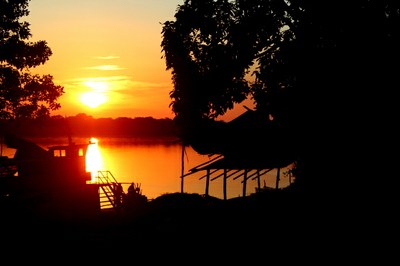
Pantoja to Iquitos
On Saturday afternoon, while Bibi and I were out washing clothes, we heard the boat off in the distance. The day had arrived. We were still more or less packed from the night prior, and when the boat pulled in, I was ready to board, tent in hand. Sadly, the boat would not be leaving until Monday morning, though I was able to secure the right to put the tent on the boats roof and avoid the horrific pictures I’d seen online of 3 layers of hammocks, strung up together in a human spider web on the passenger level.
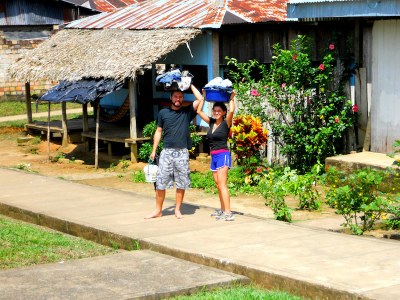
On Sunday afternoon, upon waking from my nap, I began construction of El Castillo on the roof of the river boat. I knew heavy rains and super intense sun were a given for the 5 day trip, and that the tent alone wouldn’t be enough. No matter. I figured conditions in the Amazon couldn’t be any more brutal than the Bonnaroo Music Festival in the Tennessee summer heat – though there was the concern of the tent actually tumbling 20 feet into the river below. When it was all said and done, we had a home strait out of Fitzcaraldo.
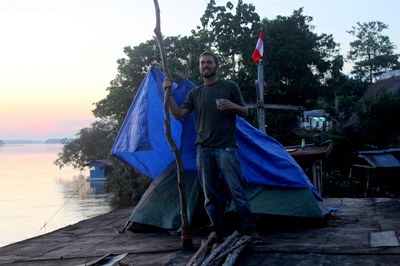
Riding down the Rio Napo on this cargo boat was the experience of a lifetime. I have no desire to ever do it again. In fact, its very near the top of my list of things to never do again. But now that its over, and I’m sitting comfortable in a hotel with internet and a fresh glass of jugo de maracuya, I’m glad we did it the way we did. It will no doubt go down as one of the most memorable experiences of the journey. Nothing sticks like shit, and this journey was full of it!
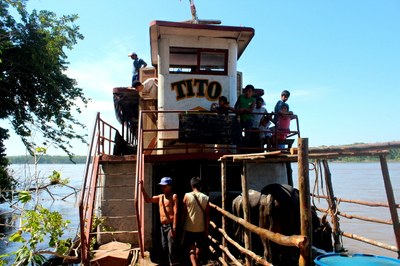
First, I will say, I’ve never experienced conditions more unsanitary in my life. I would estimate that there were 60 people, 15 pigs, 5 cows, 200 chickens, and 20 ducks, with 1 toilet that didn’t flush. Incidentally, this toilet was right next to the kitchen. As were the pigs. The only reason I got sick later than everyone else was the healthy supply of caña liquor Nicholas and I drank throughout the journey.
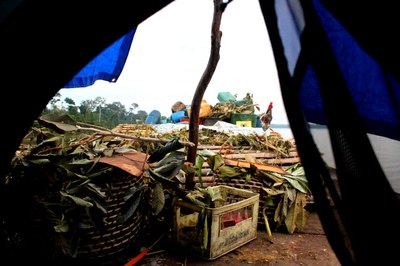
Our cargo ship stopped every 20 minutes to pick up new freight from each little village along the way. And each stop, Nicholas and I would put aside our chess game and watch as men would scurry to load our vessel, two bushels of plantains stacked on their shoulders at a time. The captain of our vessel bought anything and everything from these little villages, which he would sell in Iquitos. Plantains seemed to be the cargo of choice. We’d heard that the city of Iquitos consumes 30,000 plantains each day. If that’s true, I believe that we must have supplied the city for at least a week.
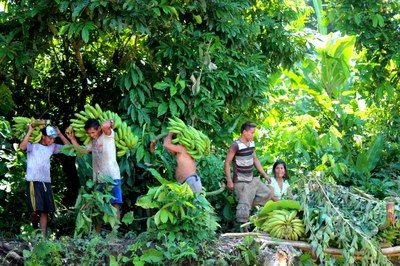
The food, which we tried to avoid as much as possible, was rice, pasta, and one bite of meat. Given that Chris and I had put away 75 wings in a sitting just a month earlier, it was a pretty radical change for one wing be cut 10 ways. But after everyone started getting sick, we all stopped eating as we really didn’t trust the food anymore. Except for Nicholas. Nicholas stood above it all, going back for seconds and thirds. Never doubt the power of cheap liquor and hot peppers to kill bacteria.
The days were brutally hot, conditions were cramped, and on top of it all, there were a number of problems along the way. One night the boat hit ground, and with some 100 tones of cargo, all attempts to pull the boat with canoes powered by 60 stroke engines would have been laughable, had not the attempt in and of itself made me lose faith in our captain’s good sense. Before going to sleep that night, I told Bibi that I expected that they would have to evacuate the boat in the morning. It did not seem like another viable option was available short of waiting for it to rain. Well, we awoke at 430am to a loud banging against the side of the boat. Roused from my sleep, I had no idea what was happening, but jumped on Bibi’s head and covered my own for protection, scaring her far more than the noise of the branches that we were scraping against. Nevertheless, I was proud of my instincts. And we were free, floating once more, blindly down the river. Eventually the captain was awakened, the engines started, and the boat was set on course again. After a brief celebration, we returned to the tent, happy to be moving.
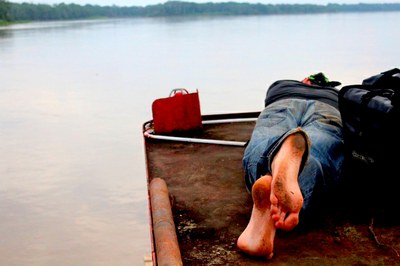
We rolled into Mazan on the fifth day around noon. The site of this little river town made my heart rejoice. Although our boat continued on to Iquitos, we saved ourselves a day by exiting in Mazan, bicycling across the town, and taking a motorboat across the Amazon into Iquitos. Before departing Mazon, we met a couple who had been living there for some 6 months building a boat. We would meet others who were building or purchasing their own boats for their Amazon adventure. I imagined how fun it would be to build a bicycle powered boat and do a bit more exploring in the jungle, but to be quite honest, I prefer the mountains and the beaches. The jungle is just too hot for biking!
The trip from Pantoja to Mazan cost 85 soles ($34) per person with 5 days of meals included. The hop from Mazan was an addition 15 soles ($6). On top of that, we had 7 days in Pantoja where we were spending less than $5 per day, which brought us to Iquitos WAY under budget for the month.
It was time enjoy ourselves.
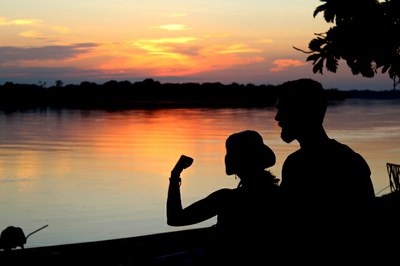
Photo credits: Bibiana Robles and Maren Lindsiepe

